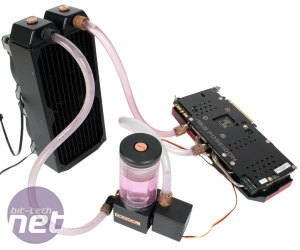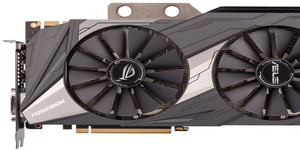
Asus GeForce GTX 980 Poseidon Platinum 4GB Overclocking Results
With the power limit at 125 percent and the temperature limit raised to 91°C in MSI Afterburner, we were able to add 180MHz to the core, taking it to 1,358MHz. This gave us a boost clock of 1,459MHz, but the card was stable boosting to a constant 1,496MHz under real load. This is a 15 percent overclock over Asus's own speeds, or 21 percent compared to stock GTX 980 clocks. It's a better overclock than we managed with our reference card but not as high as any other custom GTX 980 we've seen so far, all of which have managed base clocks of at least 1,378MHz and boosted to over 1,500MHz. That said, it's a small difference, likely accounted for by sample variation than anything else.With the memory, we were able to reach 7.9GHz without issue. We're used to seeing these Samsung memory chips reach at least 7.7GHz on Maxwell cards, but specifically on GTX 980s the highest we've managed until now was 7.8GHz, so it's a very good result. It's a 13 percent overclock that takes the card's memory bandwidth from 224GB/sec to 252.8GB/sec.
Water-cooling
Liquid cooling lets you reach temperatures much closer to the ambient air temperature than air cooling while water's higher heat capacity means you can cool your hardware with a lot less noise and, in theory, have a higher overclocking potential. To test its impact here, we set up a basic loop for the GTX 980 Poseidon Platinum comprising a full height 240mm radiator with dual Corsair SP120 fans and a Phobya DC12-400 pump. We're interested in maximum performance here, so we ran everything at full speed. We began by benchmarking Unigine Valley again at stock speeds to see if the improved cooling made much difference to stock performance (i.e. by allowing the card to boost higher more often). We also re-ran our standard thermal test to gauge the impact on temperatures.With over 20°C knocked off the load temperature (see the previous page for the results), we wanted to see if we could squeeze any more performance out through overclocking. We did manage to, but not by much. We added a further 20MHz to the core, taking it to 1,378MHz (1,479MHz boost), whereby the card boosted happily to 1,516MHz under load, bringing it right in line with the other custom GTX 980s we've seen so far. Additional voltage wouldn't allow us to go any higher. The memory was actually more responsive, and we managed to get it all the way to 8.1GHz effective, a very strong result. It was even surviving benchmarks at 8.2GHz, but not without artefacts, so we dialled it down a notch. The results of the air and liquid-based overclocks can be seen below.

MSI MPG Velox 100R Chassis Review
October 14 2021 | 15:04









Want to comment? Please log in.